
Whether you’re purchasing new appliances or just want to maintain the ones you already have, you can benefit from professional guidance. Photo: Asien’s Appliance, Inc. ©2019
You rely on your home appliances to perform a lot of tasks, from cooking food to cleaning dishes and clothes. Not surprisingly, when even one appliance stops working, it can throw a wrench into your daily routine. That’s why it’s wise to invest in quality appliances and be proactive about keeping them maintained. In the following article, seven Diamond Certified Expert Contributors provide their tips for choosing and maintaining home appliances.
Purchasing an Appliance
A home appliance is a big investment, so you’ll want to make a well-informed decision when purchasing. Consider the following tips:
Take advantage of the latest technology. In the 21st century, technological innovation is advancing at an unprecedented pace, and the appliance industry is no exception. That’s why Jeff Teal of Asien’s Appliance, Inc. recommends finding out what new technology is available when shopping for appliances. One example he highlights is induction ranges, which have become a popular option in recent years. “What makes an induction range unique is its use of electromagnetic energy for cooking,” he explains. “Unlike thermal conduction, which heats cookware externally, induction utilizes electromagnetism to create heat energy inside the cooking vessel itself. This approach not only saves energy, it improves performance by allowing for faster cooking and quicker response to heating adjustments.”
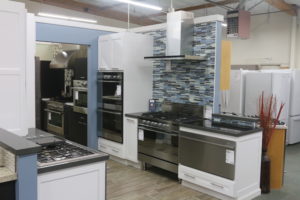
There are several factors to consider when choosing an appliance, including brand, features and specifications. Photo: Asien’s Appliance, Inc. ©2019
Look beyond brand. Some home appliance brands may seem better than others, but it’s not always so cut-and-dry. “It really depends on the actual appliance,” says Dane Marcy of Kelly’s Appliance Center. “In general, I like Whirlpool products, but there are certain LG and Samsung products I recommend as well, especially if the price is better. You also have to consider functionality. For example, I bought a General Electric oven because it had specific features that Whirlpool didn’t offer.”
Get professional insight. When seeking guidance for an appliance purchase, Jorge Paiva of Tom’s Appliance Service, Inc. suggests tapping an under-utilized resource. “Many people spend hours reading reviews posted by other consumers, but few think to get advice from an appliance repair professional,” he says. “Call a couple of local appliance repair companies and ask which brands they recommend. Better yet, ask which brands or models typically have the most problems or which ones they won’t service.”
Verify compatibility. Another crucial aspect of choosing a home appliance is specifications like size, utility hookups and power requirements. “Each of these specifications is crucial to the installation of your appliance,” explains Richard Landen of Asien’s Appliance, Inc. “If even one of them isn’t correct, it can cause major issues. Before buying an appliance, ask the sales representative for a print-out of its specifications. You can use this to verify that it’s compatible with your kitchen’s existing layout and utility connections.”
Learn more about buying home appliances
Appliance Maintenance Tips
Washing machine maintenance
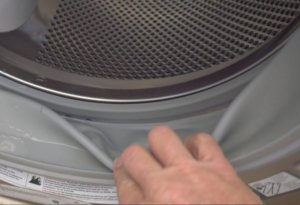
One area of a front-load washer where moisture tends to collect is the rubber door seal. Photo: HPS Palo Alto, Inc. ©2019
Modern front-loading washing machines offer several practical benefits, including improved energy/water efficiency and the option for vertical stacking. However, as Steve Spratt of HPS Palo Alto, Inc. points out, due to their sideways orientation, front-load washers have a tendency to collect moisture. “One area where this can really be an issue is the rubber door seal, which has numerous folds where moisture can collect,” he explains. “Because of this, mildew can start to develop inside your washer, and once it gains a foothold, it’s difficult to remove.”
Fortunately, Mr. Spratt says this can be prevented with a couple of basic steps. “Leaving your washer’s door open when it’s not in use will provide more air ventilation. It’s also a good idea to clean the seal and tub on a regular basis, as well as to run a cycle with a mildewcide tablet on occasion. These proactive measures will help keep your washer mildew-free.”
Dryer maintenance
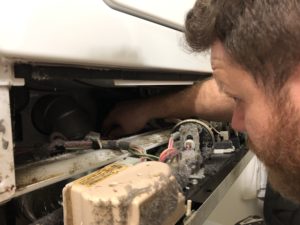
By removing dust and lint buildup, routine dryer cleanings can help prevent a fire hazard. Photo: FixEm Appliance Repair ©2019
Whereas washers can accumulate moisture, dryers tend to accumulate lint, which can cause an entirely different set of problems, from diminished performance to fire hazards. That’s why Natan Framowitz of FixEm Appliance Repair advises routinely cleaning areas where lint typically collects, such as hoses, air vents and, of course, the lint trap. Additionally, he recommends getting periodic professional cleaning services. “Over time, dust and lint can accumulate inside of a dryer’s moving parts, which can inhibit its operation and shorten its lifespan,” explains Mr. Framowitz. “During a professional maintenance service, a technician will disassemble the dryer and thoroughly clean buildup from within the drum, bearings, and other components.”
Refrigerator maintenance
According to Mr. Paiva, the most important step you can take to maintain your refrigerator is keeping the condenser coils clean. When dirt and dust are allowed to accumulate on these crucial mechanical components (which are responsible for cooling and condensing the refrigerant), it can hamper energy efficiency and even lead to premature failure of the appliance.
To avoid problems, Mr. Paiva recommends cleaning the condenser coils two to three times each year. “If your unit’s coils are located at the bottom of your refrigerator, they’ll likely need to be cleaned a little more often, as dust and dirt tend to be more present at floor level,” he adds. “Also, if you have pets that shed, this can increase the needed frequency of cleaning.”
Range maintenance
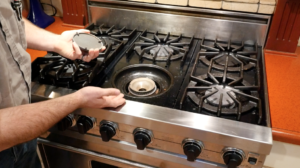
When cleaning your range, minimize the amount of liquid your burner is exposed to. Photo: Kelly’s Appliance Center ©2019
Cleaning your stovetop may seem like a simple task, but if you aren’t careful, you can inadvertently cause problems. “If the stove’s burners get exposed to too much cleaning solution, they can cease to function until they dry,” explains Mr. Marcy. “Also, if moisture gets behind the control knobs, it can potentially affect the electrical components directly behind them.” To prevent this, Mr. Marcy recommends spraying your cleaner onto a cloth prior to application rather than spraying it directly onto the stovetop. “Also, don’t oversaturate the cloth,” he adds. “If it’s very moist, you should dry off burners and other sensitive areas after cleaning them.”
When it comes to oven cleaning, Mr. Framowitz discourages using the “self-clean” feature. “This may seem like a great feature, but it can potentially cause serious problems,” he says. “The extremely high temperatures reached while in ‘self-clean’ mode can actually cause the oven’s control board to overheat and burn out, which will cause the oven to shut off and become inoperable. What’s worse, since the oven door locks shut during self-cleaning (a protective measure to ensure no one opens it during the process), it’ll remain locked after the unit shuts down.”
While this scenario doesn’t happen all the time, Mr. Framowitz says it happens often enough to recommend against using the self-clean feature. “A better choice is to clean your oven using a grease remover like EASY-OFF®. It may not be as convenient as self-cleaning, but at least you won’t run the risk of an expensive repair bill.”
Solutions to Common Dishwasher Problems
While dishwashers don’t require a lot of maintenance, they’re not invulnerable to problems. Here are a couple of common dishwasher problems and simple ways to solve them.
Broken detergent dispenser
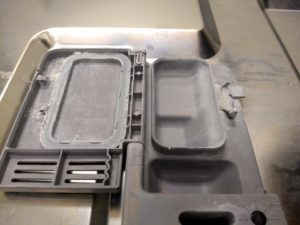
A broken detergent dispenser can complicate dishwasher use. Photo: American Ratings Corporation ©2019
Whether it won’t open, won’t close or has simply broken off, a malfunctioning detergent dispenser can be frustrating to deal with. Fortunately, Roger Boucher of De Anza Appliance has an easy workaround. “Switch from using traditional dishwasher detergent to dishwasher tablets,” he advises. “Unlike liquid detergent, which goes all over the place if it’s not contained in a compartment, a tablet can simply be placed at the bottom of the dishwasher before the wash cycle begins. There are several different types of dishwasher tablets available; I recommend Quantum Finish or Cascade Complete.”
Dish soap in the dishwasher
There’s a reason dishwashers use detergent and not traditional dish soap. Due to its sudsy character, when dish soap is exposed to the washer’s powerful mechanized spray, it basically creates a bubble bath for your dishes. However, this isn’t as fun as it sounds—the excessive suds can actually push water out of the dishwasher and cause a leak. To make matters worse, once dish soap is in your dishwasher, it can be difficult to fully remove.
Fortunately, Mr. Paiva has a simple solution to this problem: olive oil. “In addition to adding flavor to food, olive oil can be used to neutralize the effects of dish soap in your dishwasher,” he explains. “Insert two to three tablespoons of olive oil into your dishwasher, run it for about a minute, and then stop the cycle and drain the washer. Repeat these steps two or three times as needed and the dish soap residue should be gone.”
Find a Diamond Certified appliance repair company in your area
